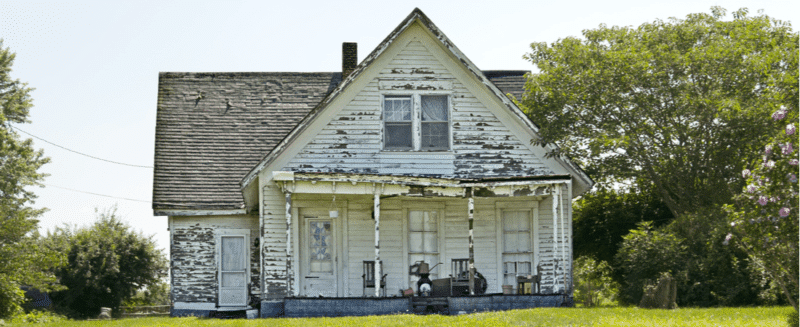Selling a house in disrepair: tax implications. This reader wants to know how selling a rundown family home will affect their income taxes.
Q: I recently received title to a home from my brother by quitclaim deed. He purchased the home in 1982 from my parents who at the time were in financial trouble.
My parents lived in the home after my brother bought it from them and paid the home’s expenses until they both died. The home has been in our family since the 1930s.
My brother had allowed family members to live in the home and collected payments from whoever was living there until the mortgage was paid off. His thoughts had been that if the home were sold, his siblings would share in equal amounts the proceeds from the home. However, he never sold the home and decided to quitclaim the home to me.
The home is in truly bad shape and not where I could repair the issues and sell it quickly. I’m trying to sell the home to a buyer for cash or to an investor. I recently received an offer for around $35,000, which is about what the home was worth back in 1982. I’m trying to figure out what I’ll have to pay in income taxes when I sell the home.
Selling a House in Disrepair: Tax Implications
A: There’re almost 100 years of history to unpack here. Let’s say you’re right and your brother paid your parents around $35,000 for the home in 1982. Over the years, he must have made capital improvements to the home. These improvements may have included replacement of the roof, the furnace or air conditioning systems, repair of some plumbing issues, and other mechanical systems.
These improvements would have increased the tax basis or what the IRS would see as the true cost of the home to your brother. (The tax basis includes the cost of purchase, cost of sale, and the cost of any structural or mechanical improvements to the property.) If your brother paid your parents $35,000 and then spent $25,000 over the years on capital improvements, the IRS would deem the tax basis of the property to be $60,000.
When you received the home, you received the home as a gift, since your brother just quit claimed the deed over to you. At the moment you got title to the home, you could make the case that your tax basis or true cost of the property was your brother’s tax basis or cost for the home, or $35,000. If you now sell the home for about what your brother had into the home, you shouldn’t have any federal income taxes to pay on the sale of the home.
Beyond that, when you sell the home, you’re going to have costs associated with the sale of the home. Those costs might result in you netting less than the full $35,000. So, given all of this, we doubt you’ll have any federal income taxes to pay.
Will Splitting Proceeds with Siblings Affect Federal Income Taxes?
When we first read your letter, we thought your question was going to revolve around your sharing the sale proceeds of the home with your siblings. It seems that your brother gave you the home without any conditions. Now, you, as the owner of the home can sell it and do what you want with the proceeds of the home.
On the other hand, if you feel like the family home and the proceeds from the sale of the family home should be shared with your siblings, you certainly can do that. We’re not saying that you must do that, but in case you wanted to know if you could do that, you can. And, if you do, it doesn’t seem like you or your siblings would have any federal income tax problems or issues in sharing the money.
You are allowed to give $15,000 per year to any individual (including your siblings) without any federal income tax consequences or filings. So, if you have more than two siblings and you decide to give each of them one-third of the proceeds, you’ll probably end up giving each of them around $11,000, if we assume you end up with around $33,000 when you sell the home.
There may be other circumstances associated with the property or your personal finance that could change our answer. So, you might want to talk with your tax preparer to be certain.
More on Topics Related to Selling a House in Disrepair
How to Decide if You Should You Fix up a Home or Sell “As Is”
Do You Need to Renovate an Old Inherited Home Before Selling?
Failed Home Inspection: What to Do When Home Inspection Goes Bad
Buying Property in Your Child’s Name After Foreclosure
How the Seasons Could Impact Your Home Sale
Seller Didn’t Disclose Water Damage, Now What?







Leave A Comment